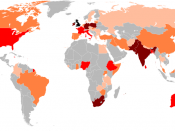Can small firms operate successfully in markets dominated by large ones?
A consistent and outstanding observed fact in business is the persistence of a non-identical size allocation of enterprises involving a relatively small number of large corporations being seriously slanted with an increasing number of small firms. It's been noticed that a persistence of this slanted increasing number of firms is gaining distribution across countries and continents through the years with an extraordinary persistence.
It's known also that a great quantity of the work power in numerous industrial civilisations make their income throughout employment in a variety of categories of small firms. Generally speaking, small companies are inclined to be labour concentrated whereas large firms tend to be more capital intensive.
Still, it's in Third World countries where manual labour is cheaper and less probable to be combined, where large firms exploit a huge sum of employment. Therefore, the small firms have been given a vital function in answering to the unemployment needs of societies and supply the needs of the big companies.
In other words, small companies perform an important role towards societies and competition between the large companies.
Generally in the North part of England, the size structure of business is a significant weight on recent shape levels of industry creation and therefore on the job-creating potential of small firms. It's been noticed that individuals working in large companies are unlikely to get on their own business whereas individuals with familiarity of working in smaller enterprises are more likely to do so (Curran et al. 1986). This may be an answer to the question of not only why do small firms exist but also how are they able to exist. Therefore may be raised a theory of deception which argues that small firms supply a dissimilar financial purpose...


